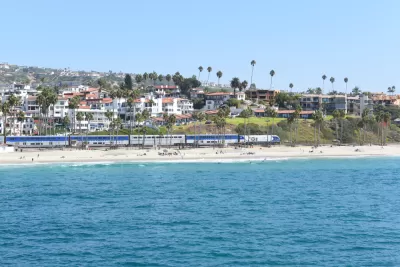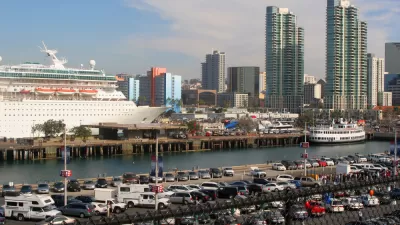The California Coastal Commission could have overturned part of San Diego's ambitious parking reform policy approved earlier this year, and would have if commission staff had won their arguments.

"[On October 16,2019] the California Coastal Commission rejected a staff recommendation to exempt a slice of the Pacific Beach area from San Diego’s new zero-minimum parking policy," reports Melanie Curry.
In March 2019, the city of San Diego approved parking reform that undundled the cost of parking from rent or purchase prices, removes parking minimums, sets parking maximums for new apartment and condominium developments in neighborhoods proximate to transit service.
The California Coastal Commission had a say on the policy because of a state preemption for development approvals in the state's coastal areas enabled by the California Coastal Act.
"The staff recommendations followed tired familiar cliches about parking," according to Curry. "Less parking will reduce beach access, they said, claiming that 'public access concerns call for more parking than is typical in the rest of the city.'"
Curry credits Alyssa Muto, deputy planning director for the City of San Diego, with "gently and thoroughly" building the case in response to the Coastal Commission staff. For instance, the parking policy "was a key part of the city’s climate action plan, based on a report that found parking reform is one of the most effective ways to reduce greenhouse gas emissions, auto trips, and traffic congestion [PDF]."
FULL STORY: Coastal Commission Accepts San Diego’s Zero-Parking Requirements for a Slice of Coastal Zone

Planetizen Federal Action Tracker
A weekly monitor of how Trump’s orders and actions are impacting planners and planning in America.

Map: Where Senate Republicans Want to Sell Your Public Lands
For public land advocates, the Senate Republicans’ proposal to sell millions of acres of public land in the West is “the biggest fight of their careers.”

Restaurant Patios Were a Pandemic Win — Why Were They so Hard to Keep?
Social distancing requirements and changes in travel patterns prompted cities to pilot new uses for street and sidewalk space. Then it got complicated.

Platform Pilsner: Vancouver Transit Agency Releases... a Beer?
TransLink will receive a portion of every sale of the four-pack.

Toronto Weighs Cheaper Transit, Parking Hikes for Major Events
Special event rates would take effect during large festivals, sports games and concerts to ‘discourage driving, manage congestion and free up space for transit.”

Berlin to Consider Car-Free Zone Larger Than Manhattan
The area bound by the 22-mile Ringbahn would still allow 12 uses of a private automobile per year per person, and several other exemptions.
Urban Design for Planners 1: Software Tools
This six-course series explores essential urban design concepts using open source software and equips planners with the tools they need to participate fully in the urban design process.
Planning for Universal Design
Learn the tools for implementing Universal Design in planning regulations.
Heyer Gruel & Associates PA
JM Goldson LLC
Custer County Colorado
City of Camden Redevelopment Agency
City of Astoria
Transportation Research & Education Center (TREC) at Portland State University
Camden Redevelopment Agency
City of Claremont
Municipality of Princeton (NJ)





























